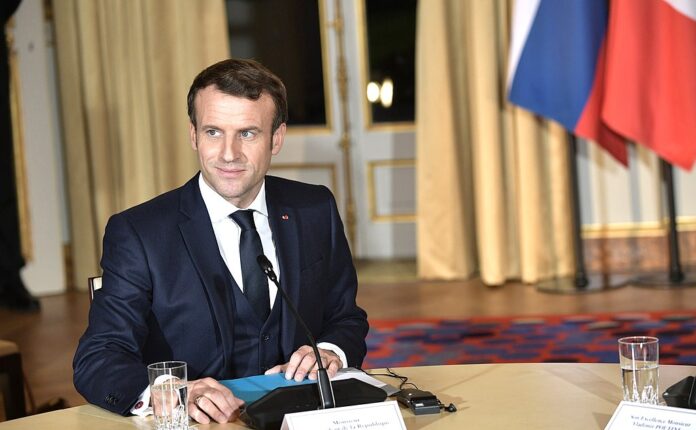French President Macron commits to maintaining a 3,000-strong police force in riot-hit New Caledonia, prioritizing peace and stability amid political tensions
French President Emmanuel Macron vowed to keep French police forces in New Caledonia for “as long as necessary” during his visit to the troubled Pacific territory. Arriving in Nouméa, Macron emphasized that restoring peace remains the “absolute priority” for his administration.
The 3,000-strong force, deployed from mainland France, will stay even during the Paris Summer Olympics if required. This deployment followed violent riots triggered by a controversial electoral reform proposed last week. The unrest has resulted in six deaths, including two police officers, and hundreds of injuries.
Indigenous Kanaks argue that the proposed electoral reform would dilute their political influence by allowing more French residents to vote in local elections. This move has exacerbated long-standing tensions between the central government in Paris and the pro-independence Kanaks, who constitute about 40% of New Caledonia’s population.
Located between Australia and Fiji, New Caledonia has been a French territory since the 19th century. The current riots mark the worst unrest since the 1980s. After landing in New Caledonia’s capital on Thursday, President Macron met with local political and business leaders, including separatist leaders. He paid respects to the victims of the riots and reiterated his call for peace, calm, and security.
“The return of peace is the absolute priority,” Macron stated. The summit with local leaders aimed to “breathe new life” into discussions about the territory’s future. Macron acknowledged the delicate nature of political conversations ahead, including the future status of New Caledonia.
Since the violence erupted on May 13, police have detained 269 individuals. New Caledonia remains under a state of emergency. However, Macron suggested that the emergency status might be lifted soon, stating, “I personally believe that the state of emergency should not be extended.”
New Caledonia’s population of around 300,000 includes 112,000 indigenous Kanaks. Under the 1998 Nouméa Accord, France agreed to grant the territory more political autonomy and restrict voting in provincial and assembly elections to those who were residents at the time. Since then, more than 40,000 French nationals have moved to the islands.
Last week, the National Assembly in Paris proposed extending voting rights to French residents who have lived in the territory for ten years. This measure, requiring a constitutional amendment, faces significant legislative hurdles. The Nouméa Accord allowed for three referendums on the territory’s future, all of which rejected independence. The first two referendums showed slim majorities for remaining part of France, while the third, held in December 2021, was boycotted by pro-independence parties due to the COVID-19 pandemic.
Analysis:
The situation in New Caledonia reflects deep-seated historical and political tensions between the indigenous Kanaks and the French government. The immediate trigger for the recent violence was the proposed electoral reform, which many Kanaks see as a threat to their political influence. This development is not just a local issue but has broader implications for France’s relationship with its overseas territories.
From a political perspective, Macron’s commitment to maintaining a police presence underscores France’s determination to retain control over New Caledonia. However, this approach risks further alienating the pro-independence Kanak population. The proposed electoral reform could be seen as a move to consolidate French influence, potentially undermining the Nouméa Accord’s spirit, which aimed to gradually increase local autonomy.
Sociologically, the unrest highlights the enduring impact of colonialism on indigenous populations. The Kanaks’ struggle for political representation and autonomy is a direct response to historical injustices and marginalization. The violence and subsequent heavy police presence could exacerbate feelings of disenfranchisement and oppression among the indigenous community, potentially leading to a cycle of unrest and repression.
Economically, prolonged instability could deter investment and tourism, key sectors for New Caledonia’s economy. The territory’s reliance on financial support from France might increase if local revenues decline due to the unrest. Additionally, the cost of maintaining a large police presence and addressing the damage caused by riots could strain both local and French resources.
Locally, the state of emergency and ongoing violence disrupt daily life for New Caledonia’s residents. The indigenous Kanak community, in particular, may face increased scrutiny and tension with law enforcement. The presence of French police might be seen as an occupying force rather than a peacekeeping one, further straining relations between local residents and the government.
The issue of voting rights for long-term French residents touches on broader themes of identity and belonging. For the Kanaks, extending these rights represents a dilution of their cultural and political identity. For the French residents, it reflects a desire for greater integration and representation within the territory’s political framework.
In conclusion, the situation in New Caledonia is a complex interplay of historical grievances, political ambitions, and socio-economic challenges. Macron’s visit and the continued presence of French police aim to restore order, but long-term peace will require addressing the underlying issues driving the unrest. This includes meaningful dialogue with the Kanak population and a balanced approach to electoral reforms that consider the concerns of all residents.
